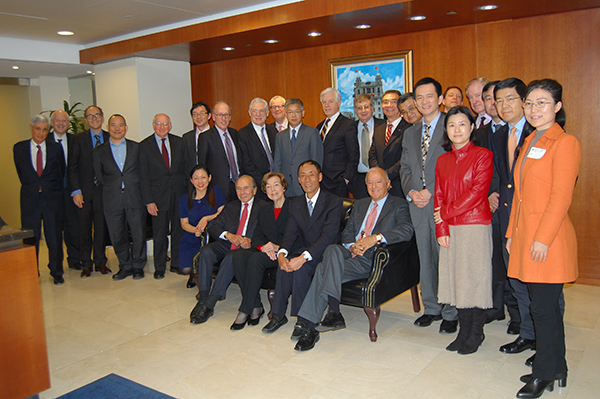

On 7 July, 2016, the 2016 Chinese Economic Forum was held in New York City. Numerous famous Chinese in attendance were of the opinion that whilst in 2016 China’s economy faces internal and external challenges, it has the ability to maintain its high level of growth.
Boyuan Foundation Chairman Qin Xiao; Peking University National School of Development Honorary Dean Justin Lin Yifu; Peking University National School of Development Dean, Prof. Yao Yang; Peking University China Macroeconomic Research Center Director, Prof. Lu Feng; China International Capital Corporation Director & General Manager, Dr. Huang Haizhou; Peking University National School of Development Vice-Dean, Prof. Huang Yiping; Agricultural Bank of China Chief Economist Dr. Xiang Songzuo and China Everbright Bank Chief Economist Dr. Xugao each discussed subjects including China’s development prior to its reform, long-term economic trends and invest opportunities. They also interacted with the audience of over 300 local economists, businesspeople and media professionals.
Peking University National School of Development Honorary Dean Prof. Justin Lin Yifu stated that, as a large developing nation, China has a high number of investment opportunities in areas such as urbanization and environmental protection. Unlike many developing countries, China has enough foreign exchange reserves and private savings to feed this investment. Currently, China needs to continue deep reform to overcome obstacles and improve economic efficiency.
According to Peking University China Macroeconomic Research Center Director, Prof. Lu Feng, in recent years it is obvious that China’s economic growth has slowed and will face large pressure but, as service industries begin to take off, this growth will not lead to deterioration in the employment market. A stable employment market will allow China more time and space in its economic transition.
Peking University National School of Development Dean, Prof. Yao Yang believes that China is promoting supply-side reform and, in the medium to long-term, may establish a new period of economic growth. However in the short-term, as pressure increases on a slowing Chinese economy, China must maintain a certain level of demand-side stimulus to ensure its smooth transition.
Peking University National School of Development Vice-Dean, Prof. Huang Yiping believes that the high fluctuation in China’s stock markets has little relation to China’s economy and, despite the challenges it is facing, the latter is considerably more stable than the former. However, stock market volatility reminds us that in addition to opening up China’s capital markets, it must affect a deeper financial reform, creating complete institutional mechanisms to realize a lower cost of capital for enterprises.
The 2016 Sino-US Economic Dialogue was held on 6 January in New York. Topics including domestic policies and economic reform in both countries were discussed in detail and some consensus was reached. On 8 January, Chinese representatives paid a visit to the U.S. Department of the Treasury, Department of Commerce, Office of Trade Negotiations and the President’s Advisory Council to understand latest developments on the U.S’ policy towards China.